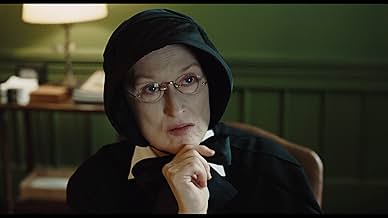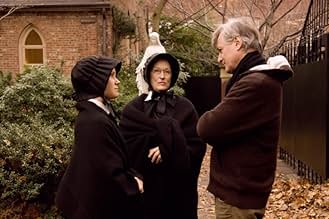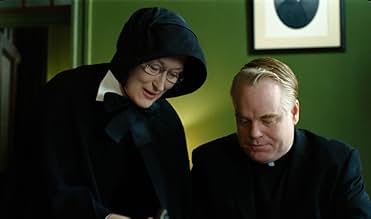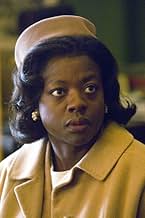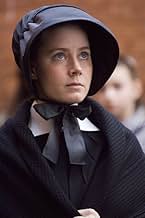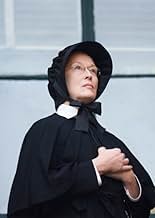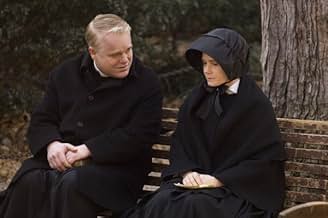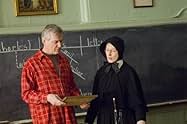Une directrice d'école catholique remet en question la relation ambiguë d'un prêtre avec un jeune élève en difficulté.Une directrice d'école catholique remet en question la relation ambiguë d'un prêtre avec un jeune élève en difficulté.Une directrice d'école catholique remet en question la relation ambiguë d'un prêtre avec un jeune élève en difficulté.
- Réalisation
- Scénario
- Casting principal
- Nommé pour 5 Oscars
- 25 victoires et 97 nominations au total
Joseph Foster
- Donald Miller
- (as Joseph Foster II)
Avis à la une
There are no better actors working in American film today than Meryl Streep and Phillip Seymour Hoffman. Streep has been on top for some time now and Hoffman has an unmatched resume of fine performances over the past five years. Pairing off as adversaries in John Patrick Shanley's stage play brought to screen they parry and prod throughout with each landing hay makers along the way.
Change is in the wind in 1964 for both the world and the Catholic Church (Second Vatican Council) as the country moves from conservatism to liberal thought. Sister Aloysius (Streep)is the principal of an inner city Catholic school who rules with an iron fist. Lamenting the loss of tradition (she thinks Frosty the Snowman is a song about worshiping false idols) she crosses swords with the popular and laid back Father Flynn who takes a more liberal view seeing the need to keep up with the times. His progressive ways gnaw at Sister Aloysius and she is soon suspecting Father Flynn of inappropriate relationship with altar boys even though she is without concrete proof.
The scenes between Streep and Hoffman are riveting from start to finish. Both attempt at first to be civil with each other but eventually they end up at each others throat bullying and threatening. It is a titanic emotional struggle that makes for a gripping drama flawlessly acted. I'm no big fan of Streep, finding the adopted accents she employs in some of her films false and hollow, but as the self righteous Nunzilla her pugnacious style and inflection rates with her Sophie's Choice performance. Hoffman has his work cut out for him to keep up with the formidable legend but he holds his own with equal footing.
In supporting roles Amy Adams is very effective as the unintended go between Sister James. Seized with doubt she like the audience mirrors our own misgivings as conflicted objective observers. Viola Davis as a troubled boy's mother has one lengthy powerful and painful scene that begins to tie loose ends together but offers no easy solution.
Writer director John Patrick Shanley does an admirable job in keeping the plot nebulous with ambivalent scenes and peripheral characters that purposefully enhance the suspense. Scenes are tightly edited with sparse but effective dialog giving the film its steady pace. Other than some jarring oblique angle shots the camera compositions and set design provide a somber ambiance for the drama and an arena for the perfectly measured performances by two masters of the craft in this fight to the finish that remains absorbing from beginning to end.
Change is in the wind in 1964 for both the world and the Catholic Church (Second Vatican Council) as the country moves from conservatism to liberal thought. Sister Aloysius (Streep)is the principal of an inner city Catholic school who rules with an iron fist. Lamenting the loss of tradition (she thinks Frosty the Snowman is a song about worshiping false idols) she crosses swords with the popular and laid back Father Flynn who takes a more liberal view seeing the need to keep up with the times. His progressive ways gnaw at Sister Aloysius and she is soon suspecting Father Flynn of inappropriate relationship with altar boys even though she is without concrete proof.
The scenes between Streep and Hoffman are riveting from start to finish. Both attempt at first to be civil with each other but eventually they end up at each others throat bullying and threatening. It is a titanic emotional struggle that makes for a gripping drama flawlessly acted. I'm no big fan of Streep, finding the adopted accents she employs in some of her films false and hollow, but as the self righteous Nunzilla her pugnacious style and inflection rates with her Sophie's Choice performance. Hoffman has his work cut out for him to keep up with the formidable legend but he holds his own with equal footing.
In supporting roles Amy Adams is very effective as the unintended go between Sister James. Seized with doubt she like the audience mirrors our own misgivings as conflicted objective observers. Viola Davis as a troubled boy's mother has one lengthy powerful and painful scene that begins to tie loose ends together but offers no easy solution.
Writer director John Patrick Shanley does an admirable job in keeping the plot nebulous with ambivalent scenes and peripheral characters that purposefully enhance the suspense. Scenes are tightly edited with sparse but effective dialog giving the film its steady pace. Other than some jarring oblique angle shots the camera compositions and set design provide a somber ambiance for the drama and an arena for the perfectly measured performances by two masters of the craft in this fight to the finish that remains absorbing from beginning to end.
Doubt is a movie that pulls no punches and wastes no time. It is about a nun who suspects a priest of having an inappropriate relationship with a student in their school. I had fully anticipated that there would be a slower build to the confrontations in the story, but I'm not sure why I thought that might happen. Considering how brash and brazen Meryl Streep plays the Principal of the school, I should have known that subtlety wasn't going to be her preferred method of handling things. Her first confrontation with the priest was a heart-pounding scene that almost made my palms sweat as if I was part of the uncomfortable situation. It was perfect that they chose to also have Amy Adams there to offer a contrast as someone who wants to avoid the conflict.
I applaud Doubt for some wonderful acting performances across the board. This movie features an all-star level of talent, and they have some serious dramatic scenes that feel tailor-made for Oscar nominations. The film is hard to watch, though. I almost squirmed right out of my chair during the scene with Viola Davis, and there are several scenes with a similar tone. It doesn't have a cathartic release at the end, in fact many of the worst elements of the plot never feel resolved. There's an uncomfortable ugliness to the way things play out in this movie, and it makes me want to watch Spotlight right after so I feel satisfied that something more has been done. Doubt is one of those movies where I respect it more than I like it. There's no denying this is quality film-making, but it is not the kind that I want to subject myself to many times in the future.
I applaud Doubt for some wonderful acting performances across the board. This movie features an all-star level of talent, and they have some serious dramatic scenes that feel tailor-made for Oscar nominations. The film is hard to watch, though. I almost squirmed right out of my chair during the scene with Viola Davis, and there are several scenes with a similar tone. It doesn't have a cathartic release at the end, in fact many of the worst elements of the plot never feel resolved. There's an uncomfortable ugliness to the way things play out in this movie, and it makes me want to watch Spotlight right after so I feel satisfied that something more has been done. Doubt is one of those movies where I respect it more than I like it. There's no denying this is quality film-making, but it is not the kind that I want to subject myself to many times in the future.
Watch this movie once, with the idea that Fr. Flynn is guilty. Then watch it again, with the idea that he is innocent. Or do it the other way around. Shanley's dialogue is so perfectly, brilliantly ambiguous that this is really two movies in one. Both are powerful, and both possibilities are horrible to contemplate, for very different reasons.
Having seen both the play (during its original run with Cherry Jones and Brian F. O'Byrne) and the film, the play obviously has the edge because it's more intimate, consisting only of four characters. The film expands its milieu (as film versions of plays typically do) but I think having the schoolchildren, other nuns, and school staff present in the film diminishes it just a bit. The play, of course, is about "knowing" things that we don't actually know, and the movie shows us some of what the play leaves to the imagination. Although the ultimate question remains ambiguous, the viewer may be distracted by looking for clues in the other characters, especially the kids.
What gives this piece its power, though, on both stage and screen, is its stubborn refusal to answer that ultimate question, or to provide any solid evidence of either conclusion, leaving it entirely up to the viewer to judge these characters.
Having seen both the play (during its original run with Cherry Jones and Brian F. O'Byrne) and the film, the play obviously has the edge because it's more intimate, consisting only of four characters. The film expands its milieu (as film versions of plays typically do) but I think having the schoolchildren, other nuns, and school staff present in the film diminishes it just a bit. The play, of course, is about "knowing" things that we don't actually know, and the movie shows us some of what the play leaves to the imagination. Although the ultimate question remains ambiguous, the viewer may be distracted by looking for clues in the other characters, especially the kids.
What gives this piece its power, though, on both stage and screen, is its stubborn refusal to answer that ultimate question, or to provide any solid evidence of either conclusion, leaving it entirely up to the viewer to judge these characters.
'Doubt' has turned out to be quite a fascinating puzzle. The story is pretty much told through dialogue rather than portrayal of events. Shanley's overwhelming screenplay is so effective and the element of mystery is carried out so strongly that even the viewer is left doubting the actions of the priest and the motives of the head nun (were her accusations legitimate or was it all an intent to ruin the priest). His incredible direction takes us through the psyche of the four principle characters.
Needless to say, the outstanding performances are just the necessary requirements that Shanley has successfully met. After all, who could ask for a better cast than Meryl Streep, Philip Seymour Hoffman, Amy Adams and Viola Davis? All these actors display some of the best acting of their career. It is both the dialogue delivery and the non-verbal gestures that strengthens the doubts in the viewers mind and makes the characters nonetheless more convincing.
The slightly washed-out colours give the look of the 60s but also adds to the mysterious atmosphere. 'Doubt' is a very thought-provoking film. It has one questioning. Should the nun have reacted or should she have waited for evidence? But what if it was already too late for evidence? What has doubt done to them? It has them questioning themselves constantly. It has stolen their sleep. We accept that it is human to doubt but what does doubt do to us? What kind of power does it hold above us? How do we react on it? When should we react on it? The director beautifully manages to convey and provoke this without appearing pretentious or preachy.
Needless to say, the outstanding performances are just the necessary requirements that Shanley has successfully met. After all, who could ask for a better cast than Meryl Streep, Philip Seymour Hoffman, Amy Adams and Viola Davis? All these actors display some of the best acting of their career. It is both the dialogue delivery and the non-verbal gestures that strengthens the doubts in the viewers mind and makes the characters nonetheless more convincing.
The slightly washed-out colours give the look of the 60s but also adds to the mysterious atmosphere. 'Doubt' is a very thought-provoking film. It has one questioning. Should the nun have reacted or should she have waited for evidence? But what if it was already too late for evidence? What has doubt done to them? It has them questioning themselves constantly. It has stolen their sleep. We accept that it is human to doubt but what does doubt do to us? What kind of power does it hold above us? How do we react on it? When should we react on it? The director beautifully manages to convey and provoke this without appearing pretentious or preachy.
In 1964 the winds of change are sweeping through Sister Aloysius' (Meryl Streep) St. Nicholas school. Father Flynn (Philip Seymour Hoffman), a charismatic priest, is advocating reform of the school's strict customs, and the first black student has just been accepted. When a fellow nun (Amy Adams) tells Sister Aloysius that Father Flynn may be paying too much personal attention to the student, Sister Aloysius begins a personal crusade against the priest -- despite her lack of evidence.
A Catholic grade school could seem like a hermetically sealed world in 1964. That's the case with St. Nicholas in the Bronx, ruled by the pathologically severe principal Sister Aloysius, who keeps the students and nuns under her thumb and is engaged in an undeclared war with the new parish priest. Their issues may seem to center around the reforms of Vatican II, then still under way, with Father Flynn (Philip Seymour Hoffman) as the progressive, but for the nun I believe it's more of a power struggle. The pope's infallibility seems, in her case, to have descended to the parish level.
Some will say the character of Sister Aloysius, played without a hint of humor .
Sister Aloysius of "Doubt" hates all inroads of the modern world, including ballpoint pens. This is accurate. We practiced our penmanship with fountain pens, carefully heading every page "JMJ" -- for Jesus, Mary and Joseph, of course. Under Aloysius' command is the sweet young Sister James, whose experience in the world seems limited to what she sees out the convent window. Gradually during the autumn semester, the situation develops.
There is one African-American student at St. Nicholas, Donald Miller, and Father Flynn encourages him in sports and appoints him as an altar boy. This is all proper. Then Sister James notes that the priest summons the boy to the rectory alone. She decides this is improper behavior, and informs Aloysius, whose eyes narrow like a beast of prey. Father Flynn's fate is sealed.
But "Doubt" is not intended as a docudrama about possible sexual abuse. It is about the title word, doubt, in a world of certainty. For Aloysius, Flynn is certainly guilty. That the priest seems innocent, that Sister James comes to believe she was mistaken in her suspicions, means nothing. Flynn knows a breath of scandal would destroy his career. And that is the three-way standoff we watch unfolding with precision and tension.
Something else happens. Donald's mother fears her son will be expelled from the school. He has been accused of drinking the altar wine. Worse, of being given it by Father Flynn. She appeals directly to Sister Aloysius. It lasts about 10 minutes, but it is the emotional heart and soul of "Doubt".
Doubt. It is the subject of the sermon Father Flynn opens the film with. Doubt was coming into the church and the United States in 1964. After the assassination of Kennedy and the beginnings of Vietnam, doubt had undermined American certainty in general. What could you be sure of? What were the circumstances? The motives? The conflict between Aloysius and Flynn is the conflict between old and new, between status and change, between infallibility and uncertainty. And Shanley leaves us doubting. "Doubt" has exact and merciless writing, powerful performances and timeless relevance. It causes us to start thinking with the first shot, and we never stop. Think how rare that is in a film.
I came to a different conclusion seeing this film. The entitled "doubt" was not about Father Flynn's guilt (which I believe becomes apparent toward the end of the film). The "doubt" is manifested in Sister Aloysius as she comes to doubt the institution of the Catholic Church she has devoted her life to. Instead of getting rid of the priest, the church covers up the crime. I think that would be enough to cause anyone to have "doubts". This was the last straw that caused this nun to have an emotional break down, reducing a once rigid woman certain in her beliefs to a sobbing and lost wreck of a human being.
To answer the obvious mystery in the film - whether Father had some sinful (or criminal) relationship with a twelve year boy? The one word answer on the platter is 'Yes'. I don't think the plot of this movie made a lot of sense for its 1964 setting. Would a nun in 1964 really suspect a priest of sexual abuse based on nothing more than a shirt being placed in a locker? In 2018, after two decades of priest abuse stories in the media, sure; however, in 1964, at a time when no one would dare criticize a man of the cloth, I have my doubts. Either way, I did enjoy the film and thought it was well-acted.
Le saviez-vous
- AnecdotesPhilip Seymour Hoffman lobbied for Amy Adams to be a part of the movie, even threatening to leave the project if she wasn't cast.
- GaffesSister Aloysius says the people of ancient Sparta resolved issues by who shouted the loudest. It was actually the ancient Athenians who did that.
People, even nuns, sometimes mix up history facts.
- Citations
Father Brendan Flynn: Doubt can be a bond as powerful and sustaining as certainty. When you are lost, you are not alone.
- ConnexionsFeatured in The 14th Annual Critics' Choice Awards (2009)
- Bandes originalesReginella Campagnola
Written by Eldo Di Lazzaro, Bruno Cherubini (as C. Bruno)
Meilleurs choix
Connectez-vous pour évaluer et suivre la liste de favoris afin de recevoir des recommandations personnalisées
- How long is Doubt?Alimenté par Alexa
- Is "Doubt" based on a book?
- The story takes place in 1964, so why is there an MP3 player in it?
- What religion are they supposed to be?
Détails
- Date de sortie
- Pays d’origine
- Sites officiels
- Langue
- Aussi connu sous le nom de
- La duda
- Lieux de tournage
- Sociétés de production
- Voir plus de crédits d'entreprise sur IMDbPro
Box-office
- Budget
- 20 000 000 $US (estimé)
- Montant brut aux États-Unis et au Canada
- 33 446 470 $US
- Week-end de sortie aux États-Unis et au Canada
- 507 226 $US
- 14 déc. 2008
- Montant brut mondial
- 51 699 984 $US
- Durée1 heure 44 minutes
- Couleur
- Mixage
- Rapport de forme
- 1.85 : 1
Contribuer à cette page
Suggérer une modification ou ajouter du contenu manquant





